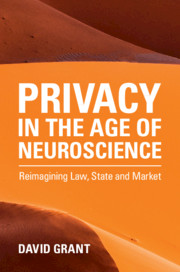Book contents
- Privacy in the Age of Neuroscience
- Privacy in the Age of Neuroscience
- Copyright page
- Contents
- Acknowledgements
- 1 Introduction
- Part I Privacy
- 2 Privacy, Neuroscience and Algorithms
- 3 The Frailty of Privacy Theory
- 4 Privacy as the History of Normalisation
- 5 Privacy, Its Values and Technology
- 6 A New Sense of Privacy
- Part II Regulation
- Bibliography
- Index
5 - Privacy, Its Values and Technology
from Part I - Privacy
Published online by Cambridge University Press: 09 April 2021
- Privacy in the Age of Neuroscience
- Privacy in the Age of Neuroscience
- Copyright page
- Contents
- Acknowledgements
- 1 Introduction
- Part I Privacy
- 2 Privacy, Neuroscience and Algorithms
- 3 The Frailty of Privacy Theory
- 4 Privacy as the History of Normalisation
- 5 Privacy, Its Values and Technology
- 6 A New Sense of Privacy
- Part II Regulation
- Bibliography
- Index
Summary
In developing a new ethic as a foundation for a non-mythological notion of privacy, we need first to put aside the informational ethics of Floridi, as that is founded on the conception of the individual as, ontologically, information. We demonstrate that this is a mythological position. Capurro has seen the errors of that argument in the dehumanisation of the individual. In moving forward, we examine the value of the full range of the standard ethical qualities on which our relationship with technology is said to be best based and thereby how we should manage its intrusions into privacy. These include dignity, liberty, identity, responsibility, democratic principles, equality, human rights and the common good. However, each of these is shown ultimately to be vulnerable to a range of shortcomings. It is argued that only respectful self-responsibility – that is, responsibility to and for oneself which is respectful of others and which relies on existential values – can act as a solid ethical foundation, although these other principles can be claimed to be of secondary value. We conclude the argument here by pointing out how that principle would not fall prey to bourgeois aspirations.
Keywords
- Type
- Chapter
- Information
- Privacy in the Age of NeuroscienceReimagining Law, State and Market, pp. 138 - 174Publisher: Cambridge University PressPrint publication year: 2021

